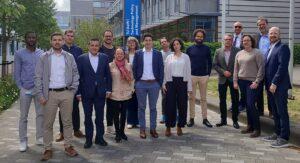By applying the City Blueprint approach, they will define the risks and opportunities for improvements in the cities of Abidjan (Ivory Coast), Lusaka (Zambia), Lagos (Nigeria) and Nairobi (Kenya).
The project aims to provide cities with a tool to assess their water, waste, and climate change challenges, using the City Blueprint Approach. UNESCO, the University of Bath and KWR will apply the tool to assess the sustainability of water management in four African cities: Abidjan (Ivory Coast), Lusaka (Zambia), Lagos (Nigeria) and Nairobi (Kenya). The project consists of three assessments: (1) the Trends and Pressures Framework (TPF), (2) the City Blueprint Framework (CBF) and (3) the Governance Capacity Framework (GCF). The baseline assessment will be performed by young professionals, with local professor, students from the University of Bath, the authors of the methodology from KWR, and UNESCO Field offices and Headquarters. They will collect the data and evaluate the 25 indicators.
The project outcomes will provide important insights into the city’s strength and weakness in water, waste, and climate change. The results will support future policymaking. We also expect that the network and synergy created during this project will stimulate further innovations and provide the young professionals with additional expertise and career opportunities.
In African countries, the most critical challenge is access to sufficient and reliable data. This project requires the gathering and exploiting of comprehensive data/information regarding water, waste and climate change. Therefore it can enhance future data availability, and quality as appropriate data and information are essential for policymaking. The three assessments play a crucial role in realizing Integrated Water Resources Management (IWRM).


